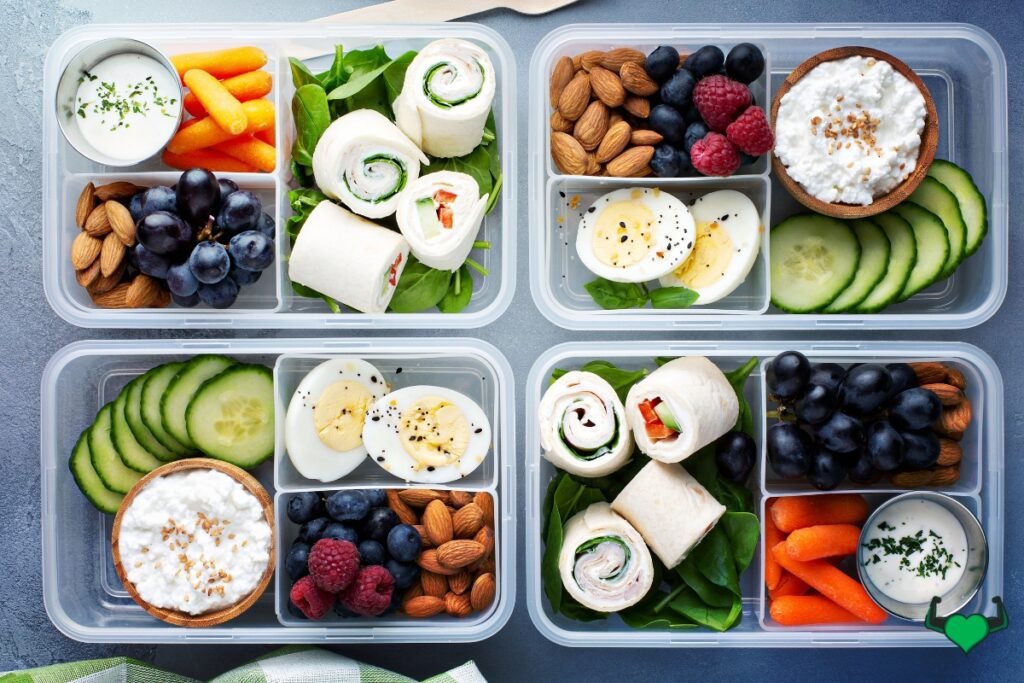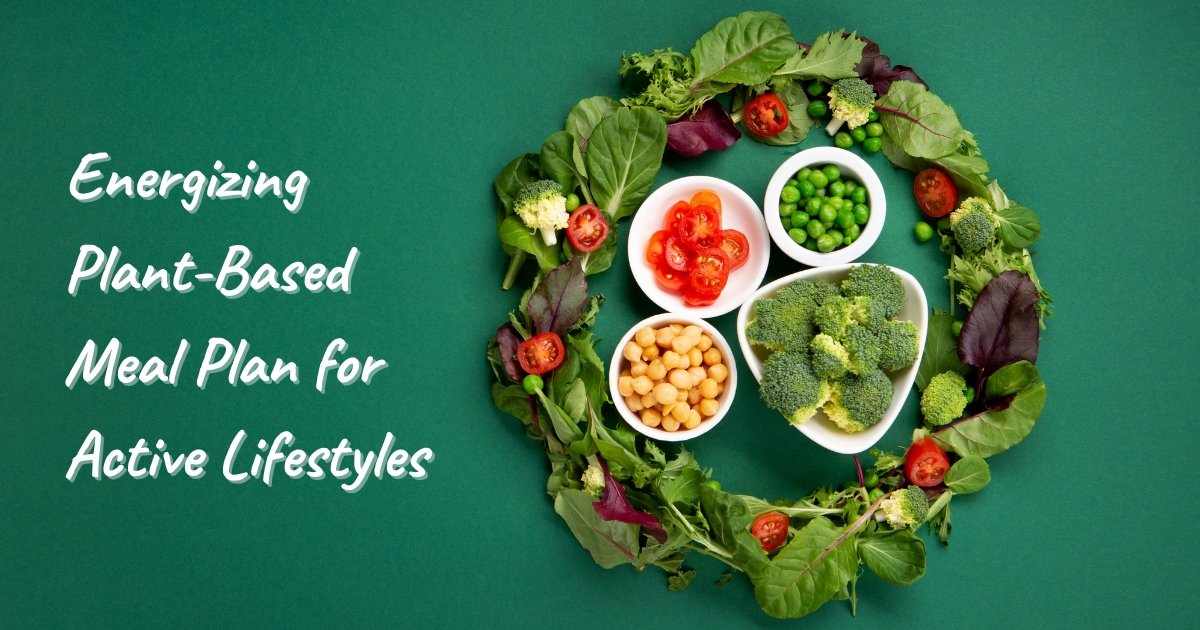Are you ready to supercharge your active lifestyle with the power of plants? You’re in for a treat! Gone are the days when athletes relied solely on animal proteins to fuel their performance. In 2024, plant-based eating is taking the fitness world by storm, and for good reason. Imagine biting into a vibrant, colorful meal that not only tastes amazing but also gives you the energy to conquer your toughest workouts. That’s the magic of a well-planned plant-based diet! In this article, we’ll dive into a mouthwatering meal plan that’ll keep you energized, recover faster, and maybe even set a new personal record. Let’s get growing and glowing!
Table of Contents
The Power of Plants: Fueling Your Active Lifestyle

Benefits of plant-based diets for athletes and active individuals
Improved Performance:
- Sustained energy from complex carbs (whole grains, fruits).
- Enhanced endurance from foods like quinoa and sweet potatoes.
Optimal Protein:
- Essential amino acids from lentils, chickpeas, tofu, and tempeh.
- Muscle building with seitan and edamame.
Faster Recovery:
- Muscle repair with post-workout smoothies and berries.
- Reduced inflammation from leafy greens and turmeric.
Essential Nutrients:
- Iron from spinach and legumes.
- Calcium from almonds and fortified plant milks.
- Omega-3s from flaxseeds and walnuts.
- B12 from fortified foods and supplements.
Hydration & Electrolytes:
- Hydrate with coconut water and electrolyte-rich fruits like bananas.
Gut Health:
- Probiotics from kimchi and sauerkraut.
- Anti-inflammatory effects from ginger and leafy greens.
Performance Optimization:
- BCAAs from peas and beans.
- Nitric oxide boosters like beets for better blood flow.
Common misconceptions about plant-based nutrition and performance
Lack of Protein:
- Misconception: Plant-based diets lack adequate protein.
- Reality: Plant-based protein sources like lentils, tofu, and chickpeas meet protein needs.
Insufficient Energy:
- Misconception: Vegan diets don’t provide enough energy for athletes.
- Reality: High-energy vegan recipes and whole food plant-based diets offer ample energy.
Nutrient Deficiencies:
- Misconception: Plant-based diets cause deficiencies in iron, calcium, and B12.
- Reality: Plant-based iron sources (spinach), vegan calcium-rich foods (fortified plant milks), and vegan B12 supplementation prevent deficiencies.
Poor Muscle Gain:
- Misconception: Athletes can’t build muscle on a plant-based diet.
- Reality: Vegan bodybuilding meals with foods like seitan and edamame support muscle growth.
Inadequate Recovery:
- Misconception: Plant-based diets hinder post-exercise recovery.
- Reality: Post-exercise vegan recovery meals with smoothies and berries enhance recovery.
Limited Endurance:
- Misconception: Plant-based diets don’t support endurance sports.
- Reality: Plant-powered endurance fuel like quinoa and sweet potatoes boosts performance.
Lack of Healthy Fats:
- Misconception: Vegan diets don’t provide essential fats.
- Reality: Plant-based omega-3 alternatives like flaxseeds and walnuts supply necessary fats.
Hydration Issues:
- Misconception: Vegan diets complicate electrolyte balance and hydration.
- Reality: Vegan hydration strategies using coconut water and electrolyte-rich fruits ensure balance.
Key nutrients to focus on for optimal energy and recovery
Protein:
- Sources: Lentils, chickpeas, tofu.
- Purpose: Muscle repair and growth.
Carbohydrates:
- Sources: Quinoa, sweet potatoes, whole grains.
- Purpose: Sustained energy and glycogen replenishment.
Iron:
- Sources: Spinach, legumes, fortified cereals.
- Purpose: Prevents fatigue, supports oxygen transport.
Calcium:
- Sources: Almonds, kale, fortified plant milks.
- Purpose: Bone health and muscle function.
Omega-3 Fatty Acids:
- Sources: Flaxseeds, chia seeds, walnuts.
- Purpose: Anti-inflammatory and cardiovascular health.
Vitamin B12:
- Sources: Fortified foods, supplements.
- Purpose: Energy production and nerve health.
Antioxidants:
- Sources: Berries, leafy greens, nuts.
- Purpose: Reduce oxidative stress and enhance recovery.
Electrolytes:
- Sources: Coconut water, bananas, leafy greens.
- Purpose: Maintain hydration and muscle function.
Amino Acids:
- Sources: Peas, beans, sunflower seeds.
- Purpose: Muscle repair and recovery.
Nutrient Timing:
- Pre-Workout: Vegan pre-workout snacks like bananas and dates.
- Post-Workout: Post-exercise vegan recovery meals like smoothies and protein shakes.
Building Your Plant-Based Plate: Macronutrient Balance

Protein sources for muscle repair and growth
For a plant-based meal plan for active lifestyles, focusing on the following plant-based protein sources is crucial for muscle repair and growth:
- Lentils: High in protein and fiber.
- Chickpeas: Versatile and rich in protein.
- Tofu: Excellent for vegan bodybuilding meals.
- Tempeh: Fermented and protein-dense.
- Seitan: High-protein meat alternative.
- Edamame: Young soybeans, great for snacking.
- Peas: Ideal for vegan BCAA sources.
- Quinoa: Complete protein with all essential amino acids.
- Hemp Seeds: Protein-rich and contain healthy fats.
- Black Beans: Staple in many high-energy vegan recipes.
Incorporating these into a vegan athlete meal plan supports muscle recovery and growth effectively.
Complex carbohydrates for sustained energy
In a plant-based meal plan for active lifestyles, complex carbohydrates are essential for providing sustained energy. Key sources include:
- Quinoa: High in protein and fiber.
- Sweet Potatoes: Rich in vitamins and slow-digesting carbs.
- Brown Rice: Provides steady energy release.
- Oats: Great for high-energy vegan recipes.
- Whole Grain Bread: Ideal for vegan athlete meal plans.
- Barley: Supports plant-based diet for runners.
- Buckwheat: Gluten-free and nutrient-dense.
- Millet: Good for vegetarian sports nutrition.
- Lentils: Double as plant-based protein sources and carb sources.
- Chickpeas: Versatile and energy-boosting.
Incorporate these foods into your meals to maintain energy levels throughout the day and during workouts.
Healthy fats for hormone balance and nutrient absorption
In a plant-based meal plan for active lifestyles, healthy fats are crucial for hormone balance and nutrient absorption. Key sources include:
- Avocados: Rich in monounsaturated fats.
- Nuts (almonds, walnuts): Provide essential fatty acids.
- Seeds (chia, flax, hemp): Excellent plant-based omega-3 alternatives.
- Olive Oil: Ideal for vegetarian sports nutrition.
- Coconut Oil: Good for plant-based fat adaptation.
- Nut Butters: Great for vegan pre-workout snacks.
- Tahini: Made from sesame seeds, high in healthy fats.
- Olives: Contain beneficial monounsaturated fats.
Including these fats in a vegan athlete meal plan supports overall health, hormone function, and the absorption of fat-soluble vitamins.
Meal Prep Magic: Time-Saving Tips for Busy Athletes

Batch cooking strategies for easy weekday meals
For a plant-based meal plan for active lifestyles, efficient batch cooking can ensure nutritious and convenient meals throughout the week. Here are some strategies:
- Plan and Prep:
- Meal Planning: Outline your vegan athlete meal plan for the week.
- Shopping List: Create a list based on high-energy vegan recipes and necessary plant-based protein sources.
- Bulk Cooking:
- Cook Grains in Bulk: Prepare large quantities of quinoa, brown rice, and oats for easy meal assembly.
- Batch Cook Proteins: Prepare lentils, chickpeas, tofu, and tempeh ahead of time.
- Versatile Bases:
- Prepare Vegetables: Roast or steam a variety of vegetables for mix-and-match meals.
- Make Sauces and Dressings: Batch prepare sauces like tahini, hummus, and pesto for added flavor.
- Storage:
- Portion and Store: Use airtight containers to store pre-cooked meals and ingredients in the fridge or freezer.
- Label and Date: Clearly label and date each container to keep track of freshness.
- Quick Assembly:
- Mix and Match: Combine different grains, proteins, and vegetables to create varied meals like vegan bodybuilding meals or post-exercise vegan recovery meals.
- Prepare Snacks: Make vegan pre-workout snacks like energy balls or nut butter bites.
- Stay Organized:
- Dedicated Meal Prep Day: Choose one day a week to batch cook and prep your meals.
- Keep it Simple: Focus on easy-to-make recipes that require minimal ingredients and time.
By following these strategies, you can maintain a whole food plant-based diet that supports your active lifestyle with minimal daily effort.
Make-ahead recipes that maintain freshness and flavor
For a plant-based meal plan for active lifestyles, these make-ahead recipes are ideal for maintaining freshness and flavor:
- Quinoa Salad:
- Ingredients: Quinoa, chickpeas, cherry tomatoes, cucumber, olive oil, lemon juice, fresh herbs.
- Storage: Keeps well for up to 5 days in the fridge.
- Chia Seed Pudding:
- Ingredients: Chia seeds, almond milk, maple syrup, vanilla extract, fresh berries.
- Storage: Lasts up to 4 days in the fridge.
- Lentil Stew:
- Ingredients: Lentils, carrots, celery, onions, tomatoes, vegetable broth, spices.
- Storage: Stays fresh for up to a week in the fridge or can be frozen for longer.
- Overnight Oats:
- Ingredients: Rolled oats, almond milk, chia seeds, fruit, nuts.
- Storage: Ready to eat for up to 3 days in the fridge.
- Hummus and Veggie Wraps:
- Ingredients: Whole grain tortillas, hummus, mixed veggies, avocado.
- Storage: Assemble wraps and store in the fridge for up to 3 days.
- Energy Balls:
- Ingredients: Dates, nuts, oats, cacao powder, coconut flakes.
- Storage: Keep in an airtight container for up to a week.
- Tofu Stir-Fry:
- Ingredients: Tofu, mixed vegetables, soy sauce, ginger, garlic, sesame oil.
- Storage: Can be stored in the fridge for up to 4 days.
These recipes are perfect for a vegan athlete meal plan, offering plant-based protein sources, high-energy vegan recipes, and vegetarian sports nutrition that stays fresh and flavorful throughout the week.
Kitchen gadgets that streamline plant-based meal prep
For a plant-based meal plan for active lifestyles, these kitchen gadgets are invaluable:
- High-Speed Blender:
- Uses: Smoothies, vegan pre-workout snacks, post-exercise vegan recovery meals.
- Food Processor:
- Uses: Chopping vegetables, making hummus, energy balls, and vegan bodybuilding meals.
- Instant Pot:
- Uses: Cooking grains, beans, and lentils quickly for high-energy vegan recipes.
- Spiralizer:
- Uses: Creating veggie noodles for plant-powered endurance fuel and low-carb options.
- Air Fryer:
- Uses: Healthy cooking of vegetables and tofu for vegan meal prep for athletes.
- Mandoline Slicer:
- Uses: Quickly slicing vegetables for salads and meal prep.
- Dehydrator:
- Uses: Making dried fruits and snacks for a plant-based diet for runners and hikers.
- Digital Kitchen Scale:
- Uses: Ensuring accurate portion sizes and nutrient tracking for vegetarian sports nutrition.
These tools help in preparing and maintaining a whole food plant-based diet efficiently, supporting various vegan athlete meal plans and dietary needs.
Breakfast of Champions: Energy-Boosting Morning Meals

Quick and portable breakfast ideas for early workouts
For a plant-based meal plan for active lifestyles, especially for early workouts, here are some quick and portable breakfast ideas:
- Overnight Oats:
- Ingredients: Rolled oats, almond milk, chia seeds, fruit.
- Benefits: High-energy vegan recipe, easy to prepare the night before.
- Smoothie Packs:
- Ingredients: Pre-portioned frozen fruits, spinach, protein powder.
- Benefits: Blend in the morning for a quick vegan pre-workout snack.
- Chia Seed Pudding:
- Ingredients: Chia seeds, coconut milk, maple syrup, berries.
- Benefits: Rich in plant-based protein sources and omega-3s.
- Energy Balls:
- Ingredients: Dates, nuts, oats, cacao powder.
- Benefits: Convenient, no-cook, vegetarian energy-boosting food.
- Nut Butter and Banana Wrap:
- Ingredients: Whole grain tortilla, almond butter, banana.
- Benefits: Simple and packed with plant-powered endurance fuel.
- Vegan Muffins:
- Ingredients: Whole grain flour, flax eggs, blueberries.
- Benefits: Make ahead and grab on the go, supports a whole food plant-based diet.
These options ensure that athletes get the necessary nutrition and energy boost to start their day and workouts effectively.
Nutrient-dense smoothie bowl recipes
For a plant-based meal plan for active lifestyles, here are some nutrient-dense smoothie bowl recipes:
1. Green Power Bowl
- Ingredients:
- Spinach
- Banana
- Avocado
- Almond milk
- Chia seeds
- Hemp seeds
- Benefits: Rich in plant-based protein sources and omega-3 alternatives, perfect for vegan athlete meal plans.
2. Berry Antioxidant Bowl
- Ingredients:
- Mixed berries (strawberries, blueberries, raspberries)
- Banana
- Coconut water
- Flaxseeds
- Granola
- Benefits: High-energy vegan recipe, loaded with plant-based antioxidants for recovery.
3. Protein-Packed Chocolate Bowl
- Ingredients:
- Banana
- Vegan protein powder
- Almond butter
- Cocoa powder
- Oat milk
- Pumpkin seeds
- Benefits: Ideal for post-exercise vegan recovery meals and vegan bodybuilding meals.
4. Tropical Energy Bowl
- Ingredients:
- Mango
- Pineapple
- Banana
- Coconut milk
- Spirulina
- Almonds
- Benefits: Provides plant-powered endurance fuel and supports vegetarian sports nutrition.
5. Iron Boost Bowl
- Ingredients:
- Kale
- Blackberries
- Banana
- Fortified almond milk
- Molasses
- Sunflower seeds
- Benefits: Excellent for plant-based iron sources and plant-based weight lifting diets.
These smoothie bowls support energy and recovery needs, making them ideal for athletes following a whole food plant-based diet.
Savory breakfast options for those who prefer a non-sweet start
1. Tofu Scramble
- Ingredients: Tofu, spinach, bell peppers, turmeric, nutritional yeast
- Benefits: High in plant-based protein sources and great for vegan athlete meal plans.
2. Chickpea Omelette
- Ingredients: Chickpea flour, water, onions, tomatoes, spinach, spices
- Benefits: Provides plant-powered endurance fuel and is ideal for plant-based weight lifting diets.
3. Avocado Toast with Sprouts
- Ingredients: Whole grain bread, avocado, alfalfa sprouts, cherry tomatoes, olive oil
- Benefits: Packed with plant-based omega-3 alternatives and vegetarian energy-boosting foods.
4. Savory Oatmeal
- Ingredients: Steel-cut oats, vegetable broth, mushrooms, spinach, nutritional yeast
- Benefits: Offers plant-based iron sources and is perfect for high-energy vegan recipes.
5. Black Bean Breakfast Burrito
- Ingredients: Whole wheat tortilla, black beans, avocado, salsa, spinach
- Benefits: Great for post-exercise vegan recovery meals and vegetarian sports nutrition.
These savory options fit well into a plant-based meal plan for active lifestyles, providing essential nutrients and energy for athletes and active individuals.
Lunch on the Go: Packable Plant-Based Power

Mason jar salads for easy transport and freshness
1. Quinoa and Chickpea Salad
- Layers: Lemon-tahini dressing, quinoa, chickpeas, cherry tomatoes, cucumbers, spinach.
- Benefits: High-energy vegan recipes and plant-based protein sources perfect for a vegan athlete meal plan.
2. Southwest Black Bean Salad
- Layers: Lime-cumin dressing, black beans, corn, bell peppers, avocado, romaine lettuce.
- Benefits: Ideal for plant-powered endurance fuel and vegetarian sports nutrition.
3. Greek Salad
- Layers: Olive oil and red wine vinegar dressing, chickpeas, cucumbers, olives, red onions, mixed greens.
- Benefits: Great for a whole food plant-based diet and meat-free fitness nutrition.
4. Lentil and Veggie Salad
- Layers: Balsamic dressing, lentils, carrots, cherry tomatoes, zucchini, arugula.
- Benefits: Provides plant-based iron sources and is suitable for vegan bodybuilding meals.
5. Asian Tofu Salad
- Layers: Soy-ginger dressing, tofu cubes, edamame, shredded carrots, bell peppers, spinach.
- Benefits: Supports a plant-based weight lifting diet and offers vegetarian energy-boosting foods.
These mason jar salads ensure easy transport and maintain freshness, fitting seamlessly into a plant-based meal plan for active lifestyles.
Hearty wraps and sandwiches that won’t get soggy
1. Chickpea Avocado Wrap
- Ingredients: Mashed chickpeas, avocado, spinach, bell peppers, whole-grain wrap.
- Tips: Layer spinach first to prevent the wrap from getting soggy.
- Benefits: High in plant-based protein and perfect for a vegan athlete meal plan.
2. Tofu and Veggie Sandwich
- Ingredients: Baked tofu, hummus, cucumbers, shredded carrots, whole-grain bread.
- Tips: Spread hummus between tofu and veggies to keep bread dry.
- Benefits: Provides plant-based protein sources and fits into vegetarian sports nutrition.
3. Lentil and Sweet Potato Wrap
- Ingredients: Cooked lentils, roasted sweet potatoes, kale, tahini sauce, whole-grain wrap.
- Tips: Pack kale between lentils and sweet potatoes to avoid sogginess.
- Benefits: Great for plant-based diet for runners and offers high-energy vegan recipes.
4. Quinoa and Black Bean Sandwich
- Ingredients: Quinoa, black beans, salsa, avocado, whole-grain bread.
- Tips: Use thick bread and place quinoa and beans in the middle layers.
- Benefits: Ideal for a plant-based weight lifting diet and vegetarian energy-boosting foods.
5. Tempeh and Veggie Wrap
- Ingredients: Marinated tempeh, shredded cabbage, carrots, cucumber, whole-grain wrap.
- Tips: Keep veggies separate until ready to eat; layer cabbage first.
- Benefits: Supports a whole food plant-based diet and meat-free fitness nutrition.
These wraps and sandwiches are perfect for maintaining freshness and are ideal for a plant-based meal plan for active lifestyles.
Thermos-friendly soups and stews for cold days
1. Lentil and Vegetable Soup
- Ingredients: Lentils, carrots, celery, onions, tomatoes, spinach.
- Benefits: High in plant-based protein sources and iron, perfect for vegan athlete meal plans and meat-free fitness nutrition.
2. Butternut Squash and Chickpea Stew
- Ingredients: Butternut squash, chickpeas, garlic, ginger, kale, vegetable broth.
- Benefits: Rich in plant-based iron and calcium, fitting well in a whole food plant-based diet.
3. Quinoa and Black Bean Chili
- Ingredients: Quinoa, black beans, tomatoes, bell peppers, corn, chili spices.
- Benefits: Provides high-energy vegan recipes, great for post-exercise vegan recovery meals.
4. Sweet Potato and Kale Soup
- Ingredients: Sweet potatoes, kale, onions, garlic, vegetable broth, coconut milk.
- Benefits: Excellent source of plant-based performance enhancers and antioxidants for recovery.
5. Split Pea and Barley Stew
- Ingredients: Split peas, barley, carrots, onions, celery, vegetable broth.
- Benefits: Ideal for plant-based carb loading and vegan meal prep for athletes.
These soups and stews are perfect for maintaining warmth and nutrition, fitting seamlessly into a plant-based meal plan for active lifestyles.
Pre-Workout Fuel: Snacks That Sustain

Timing your pre-workout snacks for optimal performance
- 1-2 Hours Before Workout:
- Snack: Oatmeal with banana and almond butter.
- Benefits: Provides sustained energy from complex carbs and healthy fats, suitable for a vegan athlete meal plan.
- 30-60 Minutes Before Workout:
- Snack: Smoothie with spinach, berries, and plant-based protein powder.
- Benefits: Quick digestion, high-energy vegan recipes, and essential plant-based protein sources.
- 15-30 Minutes Before Workout:
- Snack: Dates stuffed with almond butter.
- Benefits: Fast-acting carbs for immediate energy, perfect for plant-powered endurance fuel.
These snacks fit well into a plant-based meal plan for active lifestyles, ensuring optimal energy and performance during workouts.
Easy-to-digest options that won’t weigh you down
- Banana and Almond Butter:
- Benefits: Quick energy from carbs and healthy fats, ideal for a vegan athlete meal plan.
- Smoothie with Spinach and Berries:
- Ingredients: Spinach, berries, plant-based protein powder, almond milk.
- Benefits: High-energy vegan recipe, easy to digest, and rich in antioxidants.
- Rice Cakes with Avocado:
- Benefits: Light, easy on the stomach, and provides a good balance of carbs and healthy fats for vegetarian sports nutrition.
These options are perfect for a plant-based meal plan for active lifestyles, ensuring you stay energized without feeling weighed down.
Homemade energy bar recipe for sustained release carbs
Ingredients:
- 1 cup rolled oats
- 1/2 cup dried fruits (e.g., dates, raisins)
- 1/4 cup nuts or seeds
- 2 tbsp chia seeds
- 2 tbsp plant-based protein powder
- 2 tbsp nut butter
- 2 tbsp maple syrup
Instructions:
- Blend ingredients in a food processor.
- Press mixture into a lined baking pan.
- Refrigerate for 2 hours.
- Cut into bars.
These bars provide sustained release carbs, plant-based protein, and healthy fats, making them ideal for vegan athletes and endurance activities. They’re perfect as pre-workout snacks or post-exercise vegan recovery meals.
Post-Workout Recovery: Replenishing Plant-Based Meals

The ideal protein-to-carb ratio for muscle recovery
For optimal muscle recovery in a plant-based meal plan for active lifestyles, aim for a protein-to-carb ratio of 1:3 to 1:4. This translates to about 20-25g of protein and 60-100g of carbohydrates within 30-60 minutes post-exercise. Vegan athletes can achieve this through a combination of plant-based protein sources (like legumes, tofu, or vegan protein powder) and complex carbohydrates (such as whole grains, fruits, or starchy vegetables). This ratio supports vegan glycogen replenishment and muscle protein synthesis, crucial for vegetarian sports nutrition and vegan bodybuilding meals.
Quick and easy post-workout meal ideas
Quick post-workout meals for a plant-based meal plan for active lifestyles:
- Smoothie: Plant-based protein powder, banana, spinach, and almond milk
- Tofu scramble with whole grain toast and avocado
- Lentil pasta with tomato sauce and nutritional yeast
- Quinoa bowl with black beans, roasted vegetables, and tahini dressing
- Hummus wrap with mixed vegetables and pumpkin seeds
These meals provide a balance of plant-based proteins, complex carbs, and healthy fats, supporting muscle recovery and vegan glycogen replenishment. They’re ideal for vegan athletes and can be easily adapted for various plant-based diets, from vegan bodybuilding to vegetarian endurance nutrition.
Importance of hydration and electrolyte balance
In a plant-based meal plan for active lifestyles, proper hydration and electrolyte balance are crucial for optimal performance and recovery. Vegan athletes should focus on consuming adequate water and electrolyte-rich plant foods to maintain fluid balance, support muscle function, and prevent fatigue. Key strategies include:
- Drinking water consistently throughout the day
- Consuming electrolyte-rich foods like leafy greens, bananas, and coconut water
- Using plant-based electrolyte supplements for intense workouts or endurance activities
- Monitoring urine color to gauge hydration status
- Adjusting fluid intake based on activity level, climate, and individual needs
Proper hydration supports vegan endurance nutrition, enhances recovery, and is essential for plant-based performance in various sports, from vegan marathon nutrition to vegetarian CrossFit nutrition.
Dinner Delights: Satisfying Meals to End Your Day

One-pot wonders for easy cleanup
One-pot wonders for a plant-based meal plan for active lifestyles:
- Lentil and vegetable curry with brown rice
- Quinoa chili with beans and mixed vegetables
- Chickpea and spinach stew with sweet potatoes
- One-pot pasta with tomatoes, zucchini, and white beans
- Vegetable and tofu stir-fry with brown rice
These meals combine plant-based protein sources, complex carbs, and vegetables, providing balanced nutrition for vegan athletes. They’re ideal for vegan meal prep, offering high-energy vegan recipes that support muscle recovery and plant-powered endurance fuel. These dishes are perfect for various active lifestyles, from plant-based diet for runners to vegetarian strength training diet.
Plant-based versions of classic comfort foods
Plant-based versions of classic comfort foods for active lifestyles:
- Lentil shepherd’s pie with cauliflower mash
- Chickpea “tuna” salad sandwich
- Cashew mac and cheese with added vegetables
- Black bean and sweet potato burgers
- Cauliflower buffalo “wings” with cashew ranch dip
These dishes provide familiar flavors while supporting a vegan athlete meal plan. They incorporate plant-based protein sources and complex carbs, making them suitable for vegan bodybuilding meals or a plant-based diet for runners. These comfort foods can be part of a balanced whole food plant-based diet, offering both nostalgia and the nutrients needed for vegetarian sports nutrition and meat-free fitness nutrition.
Grain bowl combinations for endless variety
Grain bowl combinations for a plant-based meal plan for active lifestyles:
- Quinoa + black beans + roasted sweet potato + kale + avocado
- Brown rice + edamame + grilled tofu + broccoli + sesame seeds
- Farro + lentils + roasted vegetables + spinach + tahini dressing
- Bulgur + chickpeas + cucumber + tomato + herbs + lemon dressing
- Barley + tempeh + roasted beets + arugula + walnuts
These bowls offer balanced nutrition for vegan athletes, combining complex carbs, plant-based proteins, and vegetables. They’re versatile for various needs, from vegan bodybuilding meals to plant-based diet for runners. Easy to prep and customize, they support vegetarian sports nutrition, provide plant-powered endurance fuel, and can be adapted for specific goals like plant-based carb loading or post-exercise vegan recovery meals.
Supplement Smart: Filling Nutritional Gaps

Essential supplements for plant-based athletes
Essential supplements for a plant-based meal plan for active lifestyles:
- Vitamin B12
- Vegan omega-3 (algae-based)
- Vitamin D
- Iron
- Zinc
- Plant-based protein powder
- Creatine
These supplements support vegan athlete meal plans by addressing potential nutrient gaps. They’re crucial for vegetarian sports nutrition, aiding in muscle recovery, energy production, and overall health. Particularly important are vegan B12 supplementation and plant-based omega-3 alternatives. Always consult a healthcare professional before starting any supplement regimen, as needs may vary based on individual factors and specific athletic goals.
Natural food sources of key nutrients
Natural food sources of key nutrients for a plant-based meal plan for active lifestyles:
- Protein: Lentils, chickpeas, tofu, tempeh, quinoa
- Iron: Spinach, pumpkin seeds, fortified cereals
- Calcium: Kale, chia seeds, fortified plant milks
- Omega-3: Flaxseeds, walnuts, algae oil
- B vitamins: Nutritional yeast, whole grains
- Zinc: Pumpkin seeds, cashews, oats
- Vitamin D: Mushrooms (UV-exposed), fortified foods
These foods support vegan athlete meal plans, providing essential nutrients for vegetarian sports nutrition. They’re crucial for plant-based diets for runners, vegan bodybuilding meals, and overall plant-powered endurance fuel. Incorporating these into meals ensures a well-rounded, whole food plant-based diet suitable for various active lifestyles.
When and how to incorporate supplements into your diet
In a plant-based meal plan for active lifestyles, incorporate supplements when:
- Blood tests show deficiencies
- Dietary intake is insufficient
- Training intensity increases
Key supplements and timing:
- B12: Daily, with meals
- Omega-3: With fatty meals for absorption
- Protein powder: Post-workout or between meals
- Creatine: 3-5g daily, timing less crucial
- Iron: Between meals, avoid with calcium
Always prioritize whole foods first. Consult a nutritionist for personalized advice on vegan athlete meal plans and vegetarian sports nutrition. Supplement needs may vary based on individual factors and specific athletic goals, such as vegan bodybuilding or plant-based diet for runners.
Conclusion
Congratulations! You’re now armed with a plant-powered meal plan that’ll fuel your active lifestyle and keep you performing at your peak. Remember, transitioning to a plant-based diet is a journey, not a race. Be patient with yourself, experiment with new foods, and most importantly, listen to your body. As you incorporate these energizing meals and snacks into your routine, you might just find yourself running faster, lifting heavier, or simply feeling more vibrant in your daily life. So, are you ready to take the plant-based plunge? Your taste buds, muscles, and personal records are in for a treat. Let’s make 2024 your healthiest, most active year yet – powered by plants!





Pingback: Top Vegan Sources of Omega-3 for a Healthy Diet in 2024 - VitalityFitHub